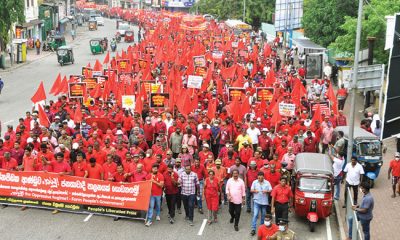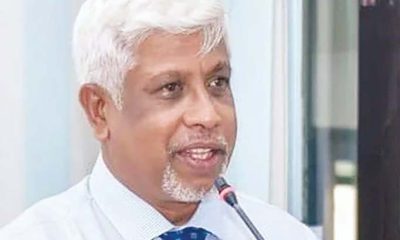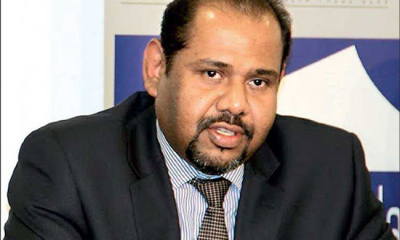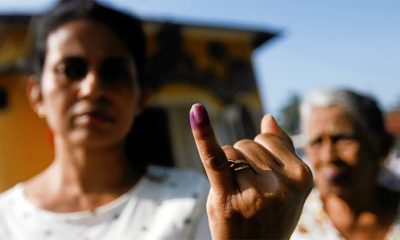Features
IS THIS THE BEST AMERICANS CAN DO?
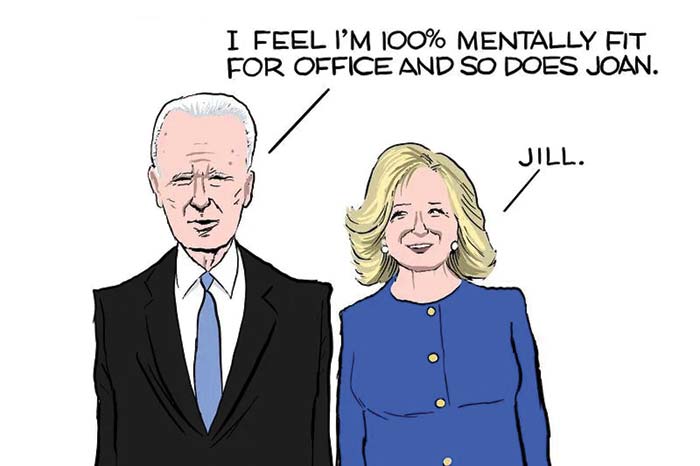
A WELL-MEANING, ELDERLY 81-YEAR-OLD MAN OR A 77-YEAR-OLD CONVICTED RAPIST FACING 91 FELONIES?
by Vijaya Chandrasoma
The presidential election in November pits the oldest man ever to contest the US presidency against the second oldest, who is also the only convicted rapist in history to run for president, as his challenger. They are breaking, in terms of senility and criminality, electoral records they themselves set in 2020!
A contest for the toughest job in the world between one decent but stumbling old man and an extraordinarily flawed human being, both on the cusp of dementia. A contest that 75% of the American electorate, Republicans, Democrats and Independents, do not want.
The overwhelming consensus today is that President Biden and former President Trump will contest the presidency in November. I am going out on a limb by predicting that the storyline of the 2024 presidential election would have changed completely after the Republican and Democratic National Committee Conventions in July and August, respectively. These Conventions ultimately decide the nominees for the presidency of their respective parties in November.
The final presidential slate ends up with the two nominees of the Republican and Democratic Parties, and a couple of independent or minor party candidates. According to the archaic rules of the Electoral College, none of these minor party and independent candidates have a snowball’s chance in hell of winning the presidency. No Third Party or Independent candidate has won any Electoral College votes or made a difference to the results of any previous presidential election.
This might change in November, 2024. The increasing popularity today of Third Party and Independent candidates, made possible entirely by the vulnerability of the nominees from the two main Parties, may enable them to act as “spoilers”.
One of these independent candidates, Robert F. Kennedy, Jr. may win some Electoral College votes, if only because of his legendary name. Although the Kennedy family, which has already endorsed President Biden, has disowned RFK Jr. because of his criminal past involving heroin use and controversial political agenda. Aother independent candidate, Professor Cornell West, who represents the progressive wing of the Democratic Party, may also win some Electoral College votes.
If these two candidates can somehow sneak in even a few Electoral College votes, they could deny the nominees of the two major parties from getting to the magic number of 270 such votes necessary to win the presidency outright in November. Unlikely, but within the realms of possibility.
Then the fun would really start.
The original, archaic intent behind the Electoral College is best described by elections expert, William C. Kimberling.
“The function of the College of Electors in choosing the president can be likened to that in the Roman Catholic Church of the College of Cardinals selecting the Pope. The original idea was for the most knowledgeable and informed individuals from each state to select the president based solely on merit and without regard to state of origin or political party”.
The conditions of this electoral system were included in the US constitution in 1787, when there were 13 “colonies” in the United States, an era when only white men were allowed the vote. An antiquity which should have been discarded a long time ago, to be replaced by the popular vote, the electoral process used not only in every other election in the United States, but in every election throughout the democratic world.
In the event that no candidate gets at least 270 Electoral College votes, the process becomes even more weird. The election of the president will be decided by the House of Representatives, with each state delegation having one vote. A majority of 26 states will be needed to win. It must be noted that a state like California, with an ethnically diverse population of 40 million, and Wyoming, with a predominantly white population of 700,000, will each have one vote.
The Senate will elect the vice-president, with one vote for each Senator (again with the population anomalies in states like California and Wyoming). A majority of 51 Senate votes will win the vice-presidency.
This wafer-thin majority in the House got even thinner after Democrat, Thomas Suozzi, convincingly won the special election in New York’s Third District, to replace George Santos, last Tuesday. Santos was the Republican congressman who was expelled for committing 21 felonies (a mere bagatelle, compared to Trump’s whopping 91), and a personal resume laced with lies even more hallucinatory than Trump’s.
Again, sans any candidate gaining a majority, the presidency and the vice-presidency will be elected by the new chambers of Congress elected in the general election in November. All 435 seats in the House of Representatives and 33 Senate seats are up for grabs in that election, after which the composition of both chambers would have undergone significant changes.
Last week, Special Counsel, Robert Hur, appointed by Attorney General Merrick Garland to investigate into the possibility of Biden misusing confidential documents during the period of his vice-presidency, concluded his report stating that, while there were no grounds to bring any criminal charges against President Biden, he was “a sympathetic, well-meaning, elderly man with a poor memory”.
Biden and his staff were infuriated by this gratuitous description, an unprofessional opinion that had no relevance in an official report of a criminal investigation. Unfortunately, the press conference Biden held after the report was released changed the headline from his innocence of criminal charges against him and drew attention to the obvious fact of his age and poor memory, when he referred to Egyptian president Sisi as the President of Mexico!
The ravages of age fall gently in some, cruelly in others. Public perception is that Biden’s age is a disqualification, though the reality is that Trump’s mental processes are clearly unraveling and becoming more dangerous by the day.
When Biden decided to run in 2020, he said he would be acting as a “bridge”, which many Americans assumed meant that he would be a one-term president, who would bridge the gap between the criminal, authoritarian Trump administration to a return to normality and democracy. This he has achieved – in spades. But no one can deny that his physical and mental faculties have deteriorated, and will continue to so deteriorate. Especially if he is expected to perform the arduous functions of the presidency during a second term, which will end when he is 86 years old!
Much as I respect President Biden, I do hope he will retire with great honors before the Democratic National Convention in August. He will then pass the baton to the younger generation of leaders of the Democratic Party, who will be eminently capable of continuing the outstanding work he has done, and will also be strong enough to stave off the threat to democracy presented by Trump and the radical right wing of the Republican Party.
Trump faced three court decisions last week in his ongoing legal saga. The first was the Manhattan state hush money criminal case involving porn star Stormy Daniels and Playboy model Karen McDougal. Trump was charged with 34 counts related to the falsification of business records in a conspiracy to influence the 2016 election. An indictment which marked the first time in US history a former president was charged with a felony.
Judge Merchan of the New York District Court got straight to the point with a written ruling on Thursday: “Defendant’s motions to dismiss have been denied”, adding that the criminal trial will start on March 25, 2024.
Trump’s defiant objection after the ruling: “This is a case which will interfere with my election campaign to contest the presidency. Even if I am guilty, it’s not a crime”. In his unhinged mind, he is above the law.
The second was the Atlanta, Georgia election interference case, where Trump was accused, along with 18 co-defendants in an attempt to overturn the 2020 Georgia election loss to President Biden.
The Georgia judge had scheduled, also on Thursday, to discuss allegations by a Trump co-defendant that the Fulton County District Attorney, Fani Willis, and a top deputy had an improper romantic relationship and mishandled public funds, which would prejudice the final outcome of the election interference case.
The hearing is ongoing. The first day resulted in clashes involving District Attorney Willis and Trump’s counsel. The consensus was that the Judge will not disqualify D. A. Willis from prosecuting the case, because nothing that transpired at the hearing detracted from the actual charges of election interference against Trump and his co-defendants. But the victory would again belong to Trump, who would have achieved his main motive for bringing all these objections and counter-allegations, to distract and delay the cases against him till after the November election.
Trump was scheduled to face yet another, third judicial decision on Friday, February 16, in a case his guilt on financial fraud has already been established; the only decision would be the extent of damages he will be required to pay for his crimes. A number predicted at around $370 million, which, when added to the $85 million he was recently ordered to pay as damages for his sexual assault of E. Jean Carroll, could wipe out his already heavily collateralized business empire in New York. The bigger penalty will be that Trump will never again be allowed to do business in New York, and perhaps Trump Tower will soon be renamed the E. Jean Carroll Plaza!
Trump will have a full-time court schedule with trial dates in four jurisdictions and 91 felonies, which will leave him with little time to lie to his supporters at campaign rallies till the election in November.
Trump’s recent comments threatening to leave NATO and encouraging Russia “to do whatever the hell they want”, are in direct contravention of the founding principles of NATO, which specify that if one NATO member is attacked, it would be considered an act of aggression against all. This dangerously irresponsible statement is completely at odds with American security, and has caused anger and disgust in America, the majority of whose citizens recognize Putin’s Russia as the nation’s principal adversary.
This appalling statement has also angered America’s long-standing allies in NATO, who feel that Trump is giving Putin the license to invade other NATO member countries, which may hasten World War III.
Whatever the polls predict today, it is inconceivable that Americans, including moderate Republicans and independents, will vote for a criminal candidate who presents a clear and present danger to the rule of law and the democracy of the nation.
The November election will ultimately favor the leader of the political party who addresses the concerns of all American citizens. The Democrats have supporters espousing a wide variety of views, center right to progressive left, who are not afraid to voice their opinions, considered to be their prerogative by the Party.
On the other hand, the Republicans talk with just the one voice, the radical-right, Christian, white supremacist, authoritarian stance parroted by Trump-fearing supplicants. A voice that has always been all about Trump, never about the country, one that is getting exponentially unhinged and dictatorial with every passing tirade. Anyone who speaks against Trump’s dictatorial policies is immediately expelled, vilified and threatened.
In all these circumstances, it is by no means certain that the November 2024 presidential election will be, as everyone expects, a straight fight between these two flawed old men. One may retire gracefully, the other should be driven out in disgrace. Either or both of these events would present Americans with a much more vigorous and commonsense choice of leadership. A president whose prime concerns will be the preservation of democracy and the rule of law, and the welfare and security of the nation and the world.
Features
A plural society requires plural governance

The local government elections that took place last week saw a consolidation of the democratic system in the country. The government followed the rules of elections to a greater extent than its recent predecessors some of whom continue to be active on the political stage. Particularly noteworthy was the absence of the large-scale abuse of state resources, both media and financial, which had become normalised under successive governments in the past four decades. Reports by independent election monitoring organisations made mention of this improvement in the country’s democratic culture.
In a world where democracy is under siege even in long-established democracies, Sri Lanka’s improvement in electoral integrity is cause for optimism. It also offers a reminder that democracy is always a work in progress, ever vulnerable to erosion and needs to be constantly fought for. The strengthening of faith in democracy as a result of these elections is encouraging. The satisfaction expressed by the political parties that contested the elections is a sign that democracy in Sri Lanka is strong. Most of them saw some improvement in their positions from which they took reassurance about their respective futures.
The local government elections also confirmed that the NPP and its core comprising the JVP are no longer at the fringes of the polity. The NPP has established itself as a mainstream party with an all-island presence, and remarkably so to a greater extent than any other political party. This was seen at the general elections, where the NPP won a majority of seats in 21 of the country’s 22 electoral districts. This was a feat no other political party has ever done. This is also a success that is challenging to replicate. At the present local government elections, the NPP was successful in retaining its all-island presence although not to the same degree.
Consolidating Support
Much attention has been given to the relative decline in the ruling party’s vote share from the 61 percent it secured in December’s general election to 43 percent in the local elections. This slippage has been interpreted by some as a sign of waning popularity. However, such a reading overlooks the broader trajectory of political change. Just three years ago, the NPP and its allied parties polled less than five percent nationally. That they now command over 40 percent of the vote represents a profound transformation in voter preferences and political culture. What is even more significant is the stability of this support base, which now surpasses that of any rival. The votes obtained by the NPP at these elections were double those of its nearest rival.
The electoral outcomes in the north and east, which were largely won by parties representing the Tamil and Muslim communities, is a warning signal that ethnic conflict lurks beneath the surface. The success of the minority parties signals the different needs and aspirations of the ethnic and religious minority electorates, and the need for the government to engage more fully with them. Apart from the problems of poverty, lack of development, inadequate access to economic resources and antipathy to excessive corruption that people of the north and east share in common with those in other parts of the country, they also have special problems that other sections of the population do not have. These would include problems of military takeover of their lands, missing persons and persons incarcerated for long periods either without trial or convictions under the draconian Prevention of Terrorism Act (which permits confessions made to security forces to be made admissible for purposes of conviction) and the long time quest for self-rule in the areas of their predominance
The government’s failure to address these longstanding issues with urgency appears to have caused disaffection in electorate in the north and east. While structural change is necessarily complex and slow, delays can be misinterpreted as disinterest or disregard, especially by minorities already accustomed to marginalisation. The lack of visible progress on issues central to minority communities fosters a sense of exclusion and deepens political divides. Even so, it is worth noting that the NPP’s vote in the north and east was not insignificant. It came despite the NPP not tailoring its message to ethnic grievances. The NPP has presented a vision of national reform grounded in shared values of justice, accountability, development, and equality.
Translating electoral gains into meaningful governance will require more than slogans. The failure to swiftly address matters deemed to be important by the people of those areas appears to have cost the NPP votes amongst the ethnic and religious minorities, but even here it is necessary to keep matters in perspective. The NPP came first in terms of seats won in two of the seven electoral districts of the north and east. They came second in five others. The fact that the NPP continued to win significant support indicates that its approach of equity in development and equal rights for all has resonance. This was despite the Tamil and Muslim parties making appeals to the electorate on nationalist or ethnic grounds.
Slow Change
Whether in the north and east or outside it, the government is perceived to be slow in delivering on its promises. In the context of the promise of system change, it can be appreciated that such a change will be resisted tooth and nail by those with vested interests in the continuation of the old system. System change will invariably be resisted at multiple levels. The problem is that the slow pace of change may be seen by ethnic and religious minorities as being due to the disregard of their interests. However, the system change is coming slow not only in the north and east, but also in the entire country.
At the general election in December last year, the NPP won an unprecedented number of parliamentary seats in both the country as well as in the north and east. But it has still to make use of its 2/3 majority to make the changes that its super majority permits it to do. With control of 267 out of 339 local councils, but without outright majorities in most, it must now engage in coalition-building and consensus-seeking if it wishes to govern at the local level. This will be a challenge for a party whose identity has long been built on principled opposition to elite patronage, corruption and abuse of power rather than to governance. General Secretary of the JVP, Tilvin Silva, has signaled a reluctance to form alliances with discredited parties but has expressed openness to working with independent candidates who share the party’s values. This position can and should be extended, especially in the north and east, to include political formations that represent minority communities and have remained outside the tainted mainstream.
In a plural and multi-ethnic society like Sri Lanka, democratic legitimacy and effective governance requires coalition-building. By engaging with locally legitimate minority parties, especially in the north and east, the NPP can engage in principled governance without compromising its core values. This needs to be extended to the local government authorities in the rest of the country as well. As the 19th century English political philosopher John Stuart Mill observed, “The worth of a state in the long run is the worth of the individuals composing it,” and in plural societies, that worth can only be realised through inclusive decision-making.
by Jehan Perera
Features
Commercialising research in Sri Lanka – not really the healthiest thing for research

In the early 2000s, a colleague, returning to Sri Lanka after a decade in a research-heavy first world university, complained to me that ‘there is no research culture in Sri Lanka’. But what exactly does having a ‘research culture’ mean? Is a lot of funding enough? What else has stopped us from working towards a productive and meaningful research culture? A concerted effort has been made to improve the research culture of state universities, though there are debates about how healthy such practices are (there is not much consideration of the same in private ‘universities’ in Sri Lanka but that is a discussion for another time). So, in the 25 years since my colleague bemoaned our situation, what has been happening?
What is a ‘research culture’?
A good research culture would be one where we – academics and students – have the resources to engage productively in research. This would mean infrastructure, training, wholesome mentoring, and that abstract thing called headspace. In a previous Kuppi column, I explained at length some of the issues we face as researchers in Sri Lankan universities, including outdated administrative regulations, poor financial resources, and such aspects. My perspective is from the social sciences, and might be different to other disciplines. Still, I feel that there are at least a few major problems that we all face.
Number one: Money is important.
Take the example American universities. Harvard University, according to Harvard Magazine, “received $686.5 million in federally sponsored research grants” for the fiscal year of 2024 but suddenly find themselves in a bind because of such funds being held back. Research funds in these universities typically goes towards building and maintenance of research labs and institutions, costs of equipment, material and other resources and stipends for graduate and other research assistants, conferences, etc. Without such an infusion of money towards research, the USA would not have been able to attracts (and keeps) the talent and brains of other countries. Without a large amount of money dedicated for research, Sri Lankan state universities, too, will not have the research culture it yearns for. Given the country’s austere economic situation, in the last several years, research funds have come mainly from self-generated funds and treasury funds. Yet, even when research funds are available (they are usually inadequate), we still have some additional problems.
Number two: Unending spools of red tape
In Sri Lankan universities red tape is endless. An MoU with a foreign research institution takes at least a year. Financial regulations surrounding the award and spending of research grants is frustrating.
Here’s a personal anecdote. In 2018, I applied for a small research grant from my university. Several months later, I was told I had been awarded it. It comes to me in installments of not more than Rs 100,000. To receive this installment, I must submit a voucher and wait a few weeks until it passes through various offices and gains various approvals. For mysterious financial reasons, asking for reimbursements is discouraged. Obviously then, if I were working on a time-sensitive study or if I needed a larger amount of money for equipment or research material, I would not be able to use this grant. MY research assistants, transcribers, etc., must be willing to wait for their payments until I receive this advance. In 2022, when I received a second advance, the red tape was even tighter. I was asked to spend the funds and settle accounts – within three weeks. ‘Should I ask my research assistants to do the work and wait a few weeks or months for payment? Or should I ask them not to do work until I get the advance and then finish it within three weeks so I can settle this advance?’ I asked in frustration.
Colleagues, who regularly use university grants, frustratedly go along with it; others may opt to work with organisations outside the university. At a university meeting, a few years ago, set up specifically to discuss how young researchers could be encouraged to do research, a group of senior researchers ended the meeting with a list of administrative and financial problems that need to be resolved if we want to foster ‘a research culture’. These are still unresolved. Here is where academic unions can intervene, though they seem to be more focused on salaries, permits and school quotas. If research is part of an academic’s role and responsibility, a research-friendly academic environment is not a privilege, but a labour issue and also impinges on academic freedom to generate new knowledge.
Number three: Instrumentalist research – a global epidemic
The quality of research is a growing concern, in Sri Lanka and globally. The competitiveness of the global research environment has produced seriously problematic phenomena, such as siphoning funding to ‘trendy’ topics, the predatory publications, predatory conferences, journal paper mills, publications with fake data, etc. Plagiarism, ghost writing and the unethical use of AI products are additional contemporary problems. In Sri Lanka, too, we can observe researchers publishing very fast – doing short studies, trying to publish quickly by sending articles to predatory journals, sending the same article to multiple journals at the same time, etc. Universities want more conferences rather than better conferences. Many universities in Sri Lanka have mandated that their doctoral candidates must publish journal articles before their thesis submission. As a consequence, novice researchers frequently fall prey to predatory journals. Universities have also encouraged faculties or departments to establish journals, which frequently have sub-par peer review.
Alongside this are short-sighted institutional changes. University Business Liankage cells, for instance, were established as part of the last World Bank loan cycle to universities. They are expected to help ‘commercialise’ research and focuses on research that can produce patents, and things that can be sold. Such narrow vision means that the broad swathe of research that is undertaken in universities are unseen and ignored, especially in the humanities and social sciences. A much larger vision could have undertaken the promotion of research rather than commercialisation of it, which can then extend to other types of research.
This brings us to the issue of what types of research is seen as ‘relevant’ or ‘useful’. This is a question that has significant repercussions. In one sense, research is an elitist endeavour. We assume that the public should trust us that public funds assigned for research will be spent on worth-while projects. Yet, not all research has an outcome that shows its worth or timeliness in the short term. Some research may not be understood other than by specialists. Therefore, funds, or time spent on some research projects, are not valued, and might seem a waste, or a privilege, until and unless a need for that knowledge suddenly arises.
A short example suffices. Since the 1970s, research on the structures of Sinhala and Sri Lankan Tamil languages (sound patterns, sentence structures of the spoken versions, etc.) have been nearly at a standstill. The interest in these topics are less, and expertise in these areas were not prioritised in the last 30 years. After all, it is not an area that can produce lucrative patents or obvious contributions to the nation’s development. But with digital technology and AI upon us, the need for systematic knowledge of these languages is sorely evident – digital technologies must be able to work in local languages to become useful to whole populations. Without a knowledge of the structures and sounds of local languages – especially the spoken varieties – people who cannot use English cannot use those devices and platforms. While providing impetus to research such structures, this need also validates utilitarian research.
This then is the problem with espousing instrumental ideologies of research. World Bank policies encourage a tying up between research and the country’s development goals. However, in a country like ours, where state policies are tied to election manifestos, the result is a set of research outputs that are tied to election cycles. If in 2019, the priority was national security, in 2025, it can be ‘Clean Sri Lanka’. Prioritising research linked to short-sighted visions of national development gains us little in the longer-term. At the same time, applying for competitive research grants internationally, which may have research agendas that are not nationally relevant, is problematic. These are issues of research ethics as well.
Concluding thoughts
In moving towards a ‘good research culture’, Sri Lankan state universities have fallen into the trap of adopting some of the problematic trends that have swept through the first world. Yet, since we are behind the times anyway, it is possible for us to see the damaging consequences of those issues, and to adopt the more fruitful processes. A slower, considerate approach to research priorities would be useful for Sri Lanka at this point. It is also a time for collective action to build a better research environment, looking at new relationships and collaborations, and mentoring in caring ways.
(Dr. Kaushalya Perera teaches at the Department of English, University of Colombo)
Kuppi is a politics and pedagogy happening on the margins of the lecture hall that parodies, subverts, and simultaneously reaffirms social hierarchies.
By Kaushalya Perera
Features
Melantha …in the spotlight

 Melantha Perera, who has been associated with many top bands in the past, due to his versatility as a musician, is now enjoying his solo career, as well … as a singer.
Melantha Perera, who has been associated with many top bands in the past, due to his versatility as a musician, is now enjoying his solo career, as well … as a singer.
He was invited to perform at the first ever ‘Noon2Moon’ event, held in Dubai, at The Huddle, CityMax Hotel, on Saturday, 3rd May.
It was 15 hours of non-stop music, featuring several artistes, with Melantha (the only Sri Lankan on the show), doing two sets.
According to reports coming my way, ‘Noon2Moon’ turned out to be the party of the year, with guests staying back till well past 3.00 am, although it was a 12.00 noon to 3.00 am event.

Having Arabic food
Melantha says he enjoyed every minute he spent on stage as the crowd, made up mostly of Indians, loved the setup.
“I included a few Sinhala songs as there were some Sri Lankans, as well, in the scene.”
Allwyn H. Stephen, who is based in the UAE, was overjoyed with the success of ‘Noon2Moon’.
Says Allwyn: “The 1st ever Noon2Moon event in Dubai … yes, we delivered as promised. Thank you to the artistes for the fab entertainment, the staff of The Huddle UAE , the sound engineers, our sponsors, my supporters for sharing and supporting and, most importantly, all those who attended and stayed back till way past 3.00 am.”

Melantha:
Dubai and
then Oman
Allwyn, by the way, came into the showbiz scene, in a big way, when he featured artistes, live on social media, in a programme called TNGlive, during the Covid-19 pandemic.
After his performance in Dubai, Melantha went over to Oman and was involved in a workshop – ‘Workshop with Melantha Perera’, organised by Clifford De Silva, CEO of Music Connection.
The Workshop included guitar, keyboard and singing/vocal training, with hands-on guidance from the legendary Melantha Perera, as stated by the sponsors, Music Connection.
Back in Colombo, Melantha will team up with his band Black Jackets for their regular dates at the Hilton, on Fridays and Sundays, and on Tuesdays and Thursdays at Warehouse, Vauxhall Street.
Melantha also mentioned that Bright Light, Sri Lanka’s first musical band formed entirely by visually impaired youngsters, will give their maiden public performance on 7th June at the MJF Centre Auditorium in Katubadda, Moratuwa.
-

 Features3 days ago
Features3 days agoSAITM Graduates Overcome Adversity, Excel Despite Challenges
-

 Latest News7 days ago
Latest News7 days agoNPP win Maharagama Urban Council
-

 Business6 days ago
Business6 days agoJohn Keells Properties and MullenLowe unveil “Minutes Away”
-

 Sports3 days ago
Sports3 days agoASBC Asian U22 and Youth Boxing Championships from Monday
-

 News3 days ago
News3 days agoDestined to be pope:Brother says Leo XIV always wanted to be a priest
-

 Foreign News4 days ago
Foreign News4 days agoMexico sues Google over ‘Gulf of America’ name change
-

 Opinion6 days ago
Opinion6 days agoRatmalana: An international airport without modern navigational and landing aids
-

 Opinion3 days ago
Opinion3 days agoDrs. Navaratnam’s consultation fee three rupees NOT Rs. 300



